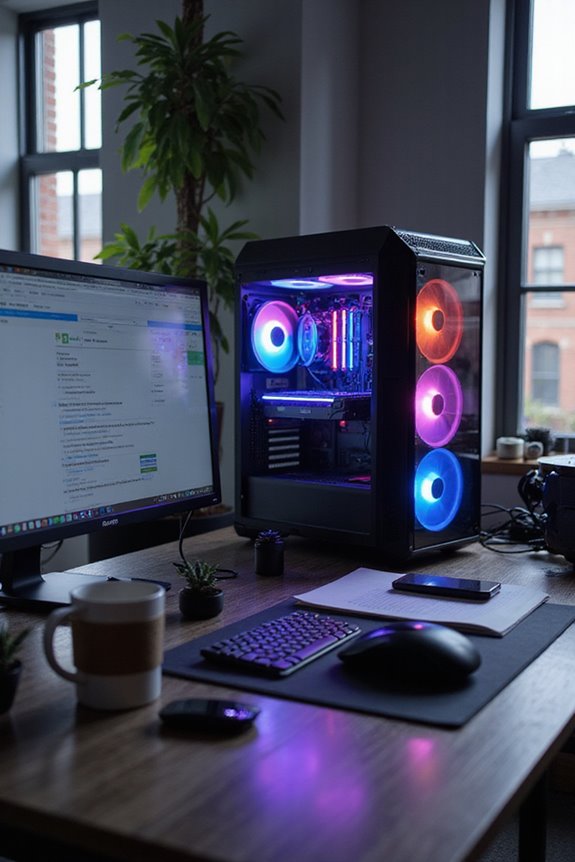Absolutely, you can use a gaming PC for everyday tasks! With powerful CPUs and ample RAM, they handle multitasking effortlessly. Plus, fast NVMe SSDs make booting up and launching applications a breeze. Discrete GPUs are fantastic for creative work, too. While they might consume more energy and can be pricier, the long-term value and upgradability are significant perks. If you’re curious about more advantages and potential quirks of gaming PCs, let’s explore further!
Key Takeaways
- Gaming PCs are equipped with powerful CPUs and ample RAM, making them excellent for multitasking and everyday tasks.
- Fast SSDs in gaming PCs ensure quick boot times and rapid software launches, enhancing user experience.
- Their robust GPUs can handle demanding applications like video editing and graphic design, making them versatile for creative work.
- Gaming PCs can be energy-efficient with power saver modes, reducing consumption during non-gaming hours.
- Customization options allow for tailored setups that fit individual needs while providing aesthetic choices like RGB lighting.
Overview of Gaming PCs
When it comes to gaming PCs, they’re not just powerhouses for playing the latest titles; they’re also versatile machines for everyday tasks. The high-performance CPUs with multiple cores and max turbo frequencies guarantee smooth multitasking, while discrete GPUs deliver stunning graphics. You’ll appreciate the fast boot times offered by NVMe SSDs, making those everyday tasks feel snappy.
Customization is a standout feature; you can upgrade components like RAM and storage as your needs change. Plus, the aesthetic choices, like RGB lighting, can make your setup uniquely yours. Just keep in mind, while these machines are robust, their cooling systems and noise levels might not suit everyone’s preference. Overall, a gaming PC can be a fantastic choice for both fun and functionality.
Performance Capabilities for Everyday Tasks
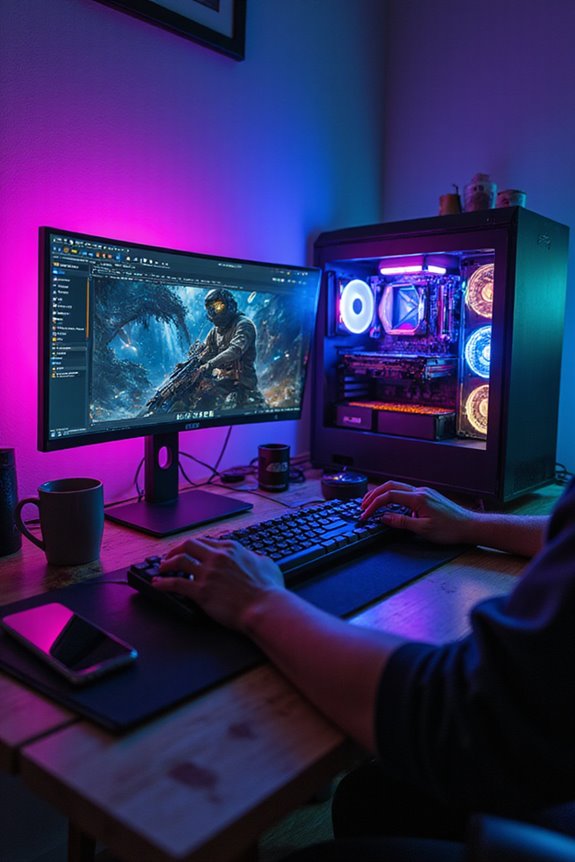
While gaming PCs are often celebrated for their gaming prowess, they also excel in everyday performance capabilities. Their robust CPUs and ample RAM allow for smooth multitasking, letting you juggle apps effortlessly. When I switch to power saver mode during non-gaming hours, I notice reduced energy consumption—great for my wallet and the environment.
Fast SSDs mean super quick boot times and software launches, so I’m never left waiting. If I need to edit videos or design graphics, the powerful GPUs handle demanding tasks with ease. Plus, multiple monitor support enhances my workflow. Just remember to close unnecessary background applications to keep things running smoothly—it’s a simple trick that makes a big difference!
Cost Considerations for Gaming PCs
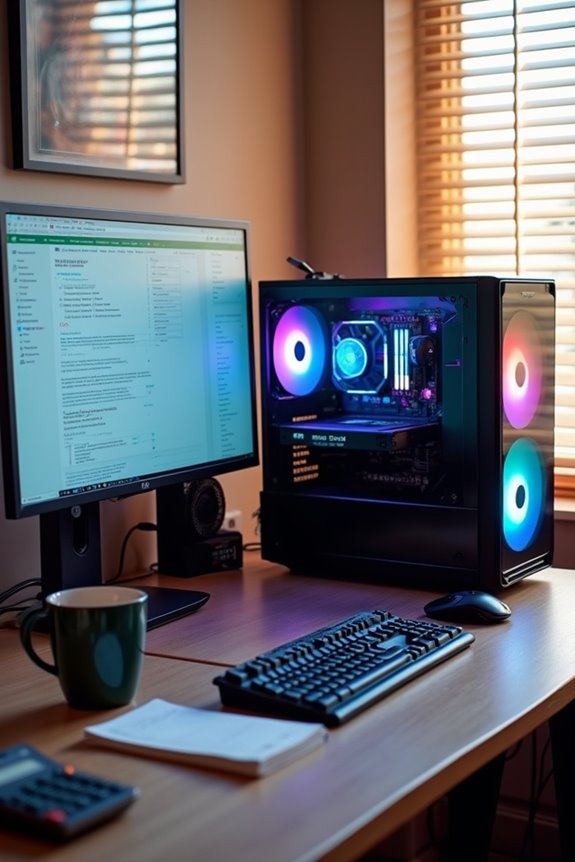
Cost considerations for gaming PCs can seem overwhelming at first, but they don’t have to be. You can find gaming setups ranging from around $500 for basic 1080p gaming to over $5,000 for ultra-high-end builds that deliver stunning 4K visuals. Typically, I’d allocate 40-50% of your budget to the GPU, as it plays a vital role in performance, while the CPU gets about 15-20%. Remember, customization is key! You can choose components that fit both your budget and gaming needs. Just keep in mind, while higher costs generally mean better performance, you might not need top-tier specs if you’re using it for everyday tasks. Happy building or buying!
Energy Consumption and Its Impact
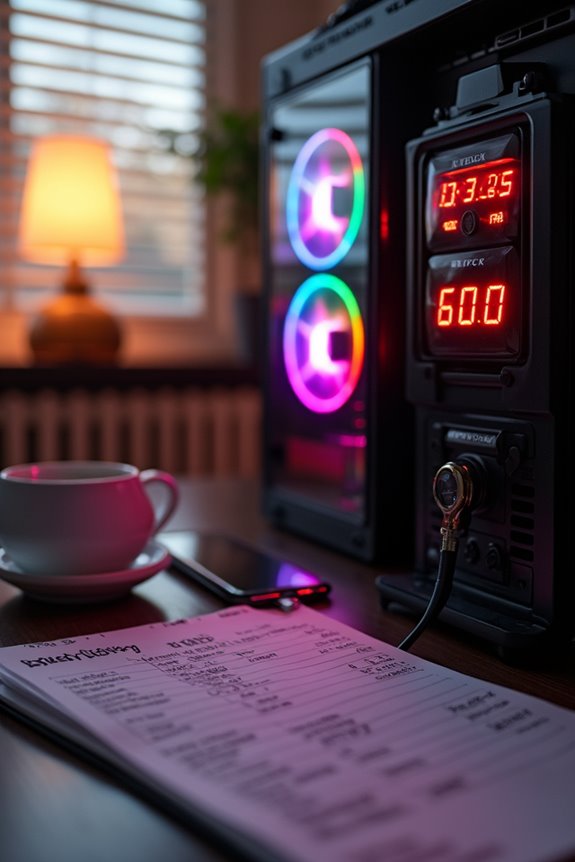
Energy consumption is a big topic to contemplate when you’re looking at gaming PCs for everyday use. These machines typically draw between 300 to 500 watts, and if you’re using it for six hours daily, you’re looking at about 2.4 kWh per day. That can add up—around $11.70 a month! While gaming PCs are powerful, they do consume more energy compared to consoles or laptops, which can hit your electricity bill hard. Plus, they contribute to a larger carbon footprint. But don’t worry; energy-efficient components can help. By selecting low-power GPUs and utilizing power-saving modes, you can enjoy gaming without feeling too guilty about the energy impact. Balancing performance and efficiency is key to a sustainable setup.
Upgradability and Customization Benefits
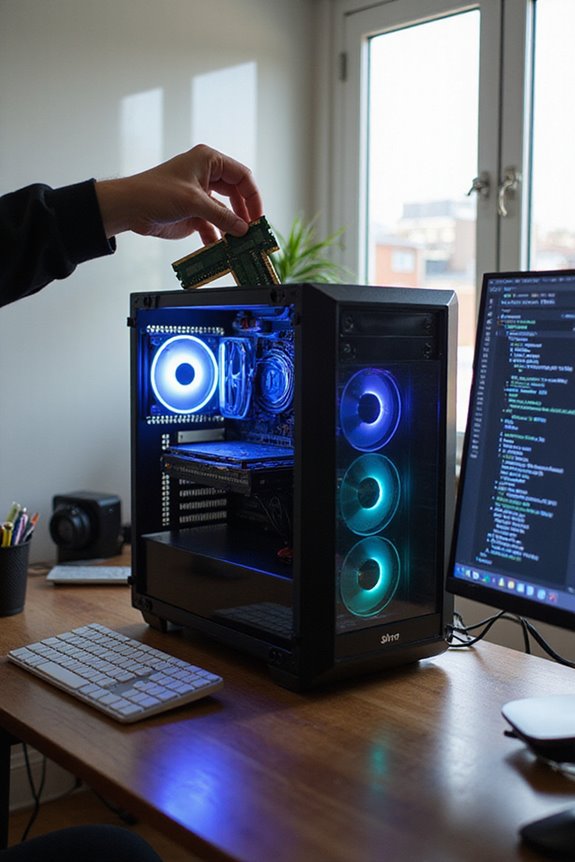
When it comes to building or buying a gaming PC, one of the most appealing aspects is the upgradability and customization it offers. You can easily swap out components like the graphics card or processor, ensuring your system stays relevant for future games or applications. This adaptability is not just about performance; it’s also cost-effective. Instead of replacing the entire system, you can upgrade individual parts based on your needs, which saves money over time.
Plus, you get to choose high-quality components that suit your style, whether it’s sleek cases or vibrant RGB lighting. Ultimately, a custom PC is like a tailored suit—perfectly fit for you, both in performance and aesthetics, without the need for a complete overhaul every few years.
Practicality for General Use
Building on the idea of customization and upgradability, gaming PCs aren’t just for hardcore gamers; they’re incredibly practical for everyday use, too. With powerful processors and ample RAM, multitasking becomes a breeze, so I can juggle multiple applications without a hitch. Plus, the dedicated graphics cards make creative tasks, like video editing, smoother and faster.
Sure, they consume more energy than standard PCs, which can hit your wallet, but the long-term efficiency often justifies the initial cost. I’ve found that the high-speed SSDs lead to faster boot times, enhancing productivity. While the upfront expense can be challenging, the resale value remains strong, making a gaming PC a solid investment for both fun and work.
Gaming Experience vs. Daily Tasks
Though gaming PCs are often associated with high-intensity gaming, they also excel at everyday tasks, making them versatile machines for various needs. With powerful GPUs, these systems deliver stunning visuals and smooth gameplay, but they don’t stop there. My gaming PC manages multitasking tasks efficiently, thanks to a solid CPU and ample RAM.
Whether I’m streaming a show or editing videos, the balanced setup guarantees I never miss a beat. Fast SSD storage makes loading documents a breeze, and I can juggle multiple applications without hiccups. Of course, if you’re mainly focused on productivity, a mid-range system can still offer great value. Ultimately, a gaming PC isn’t just for gamers—it’s a capable companion for everyday life.
Technological Advantages for Future Compatibility
Investing in a gaming PC means thinking about more than just immediate performance; it’s also about future-proofing your setup. For instance, opting for at least 32GB of RAM guarantees you won’t be left in the dust as applications demand more memory. With NVMe SSDs, you’ll enjoy lightning-fast data access, essential for both gaming and daily tasks.
A motherboard that supports next-gen CPUs and PCIe 5.0 GPUs lays the groundwork for future upgrades, assuring compatibility. Plus, a powerful CPU with six to eight cores makes multitasking a breeze. And let’s not forget a high-wattage PSU, allowing for easy expansion down the line. In short, these tech choices help keep your rig ready for whatever comes next.
Noise Levels and Space Requirements
When it comes to gaming PCs, noise levels and space requirements are often overlooked, yet they play an essential role in your everyday experience. I’ve found that gaming PCs can be surprisingly quiet, running as low as 20 dB, but they can also roar up to 60 dB under heavy load. If you prefer peace, look for cases with sound-dampening materials or low-speed fans. On the space front, those larger cases can take up a good chunk of your desk, especially with high-performance GPUs and custom cooling systems. So, if you’re tight on space, consider compact designs that still deliver power without the noise. Balancing these elements really enhances your everyday use while keeping things comfy.
Long-Term Value and Resale Potential
As you immerse yourself in the world of gaming PCs, understanding their long-term value and resale potential is essential for making a smart investment. The gaming PC market‘s growth is impressive, projected to exceed $287 billion by 2037. While components like GPUs and CPUs tend to depreciate quickly, quality parts can retain value better, especially power supplies.
Upgrading is common, allowing you to keep your rig relevant longer. Plus, the demand for used components is strong among enthusiasts, making resale a viable option. However, rapid tech advancements mean older models may lose value fast. In the end, a well-built gaming PC can be a lasting investment, both for your gaming experience and future resale opportunities.
Frequently Asked Questions
Can Gaming PCS Run Standard Office Software Efficiently?
Absolutely, I’ve found gaming PCs run standard office software like a dream. Their powerful hardware makes multitasking a breeze, and I love how quickly everything loads. It’s perfect for both work and play in my life!
Are Gaming PCS Suitable for Casual Web Browsing?
My gaming PC handles casual web browsing effortlessly. With its powerful components, I enjoy fast loading times, smooth multitasking, and seamless streaming, making everyday tasks feel a bit more enjoyable and efficient.
Do Gaming PCS Support Everyday Peripherals Like Printers?
I’ve connected my printer to my gaming PC effortlessly. It handles everyday peripherals like a champ, making my life easier while I enjoy gaming too. It’s a perfect blend of work and play!
How Do Gaming PCS Handle Software Updates?
I’ve found that gaming PCs handle software updates really well. They automatically alert me for updates, and I can manually check if needed. Keeping everything updated guarantees my system runs smoothly and securely for all my tasks.
Can Gaming PCS Be Quieter With Specific Setups?
Oh, the irony! My gaming PC’s roar could wake the dead, but with a few thoughtful tweaks—quieter fans, solid-state drives, and good airflow—it’s surprisingly serene now. Trust me, silence can be blissful!

